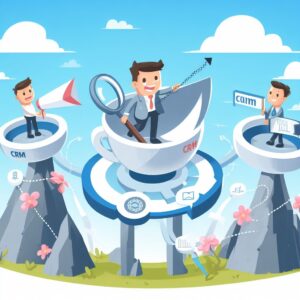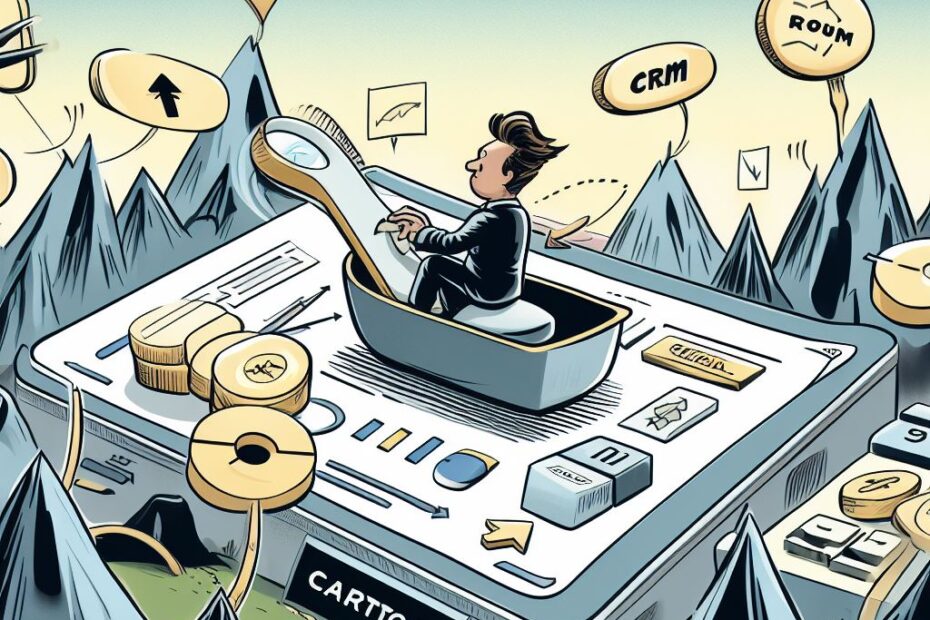Businesses globally are continually seeking to build and nurture robust customer relationships. A key instrument in this pursuit is Customer Relationship Management (CRM), which has become an essential tool for businesses looking to enhance their marketing strategies and improve customer engagement.
CRM software can streamline marketing processes, automate tasks such as email campaigns and social media posts, and free up time for more strategic activities It also enables businesses to use data analytics to understand customers and personalize marketing efforts. By analyzing customer data, businesses can identify patterns and trends, and use this information to refine their marketing strategies.
Moreover, integrating CRM with other marketing tools, such as email marketing software and social media management tools, can further streamline marketing processes and improve overall efficiency.
In today’s digital marketing era, customer experience is of paramount importance. By using CRM to personalize marketing efforts and improve customer engagement, businesses can enhance the overall customer experience. Automation is another key aspect of CRM. By automating tasks such as email campaigns and social media posts, businesses can save time and improve efficiency, while still providing personalized and relevant marketing messages.
Furthermore, the rise of artificial intelligence (AI) and big data analytics in CRM has opened up new opportunities for businesses. These technologies can transform unstructured text into structured data suitable for analysis, driving machine learning algorithms and enabling deeper text analytics.
CRM, when used effectively, can help businesses stay ahead of the competition and meet the evolving needs of their customers. By leveraging data analytics, integrating with other tools, focusing on customer experience, and embracing automation and AI, businesses can get the most out of CRM.
CRM, or Customer Relationship Management, is a dynamic field that encompasses various strategies, technologies, and best practices employed by businesses to manage and analyze customer interactions throughout their lifecycle. The primary objective of CRM is to enhance customer service, retain customers, and stimulate sales growth.
CRM systems are the backbone of this strategy, providing businesses with a comprehensive view of their customers’ interactions and behaviors. They enable businesses to automate routine tasks, respond quickly to customer requests, and personalize interactions to enhance customer satisfaction.
The use of CRM systems can benefit organizations of all sizes, from small businesses to large corporations, by making customer information such as past purchases and interaction history easily accessible. This allows customer support representatives to provide better and faster customer service.
CRM also plays a crucial role in identifying trends and insights about customers through reporting and visualization features. This data-driven approach can help businesses make informed decisions and improve their strategies.
Moreover, CRM systems are not just about storing customer data. They are tools that can be used to engage with customers and manage support requests directly from various engagement channels, such as Facebook Messenger.
However, the effectiveness of a CRM system is not just about the technology. It also depends on the people involved and the processes implemented. It’s essential to select the right tools and develop a strategy that engages customers effectively.
Lastly, it’s important to note that CRM is not a one-time setup. It requires continuous improvement and adjustment based on sales volumes and changing customer expectations. Regular reviews and updates are necessary to ensure the CRM strategy remains effective.
CRM is a powerful tool that can significantly enhance a business’s customer service, retention, and sales growth. However, its effectiveness depends on the right combination of strategies, technologies, and people.

The Expanding CRM Landscape
The CRM landscape has been experiencing a transformative evolution, surpassing the traditional boundaries of customer service and sales force automation. Today, it encompasses a multitude of areas such as marketing automation, social networking, analytics, and mobile CRM, also known as mCRM.
The future of CRM is expected to be simple, streamlined, and user-friendly, integrating advancements from the past three decades to simplify the lives of salespeople and their customers. CRM will not only focus on sales effectiveness, but also provide analytics and insights for leadership teams. This will support better coaching and decision-making, making CRM a comprehensive tool for businesses.
CRM has evolved over the years, starting from manual methods of managing customer data to the digital age where CRM software manages not just contact data but also data from activities, conversations, purchase history, and more. The modern CRM is cloud-based, mobile-friendly, and AI-optimized, offering a personalized customer experience.
The future of CRM is also about making it a single source of truth, providing a uniform support for the entire customer lifecycle. It is about putting CRM systems to maximum use and realizing their full potential. Companies must be able to support these demands by implementing a robust but flexible CRM system that can be well integrated with existing technology.
In the future, CRM will continue to grow, with younger tech companies constantly bringing new concepts and approaches to the table. The future of CRM is about making integrated sales, marketing, service, and commerce possible for all companies, and for companies to give potential and current customers connected, omni-channel experiences.
The future of CRM is also about building a tool for salespeople to sell more using automation and insights into prospects’ behaviors. CRM platforms today should augment a salesperson’s behavior and effectively tell them how to behave.
The future of CRM is bright and promising, with the potential to revolutionize the way businesses interact with their customers. It’s all about making CRM a tool that empowers the people who use it and helps businesses achieve their goals.

CRM and Data Mining: A Powerful Combination
The amalgamation of CRM (Customer Relationship Management) and data mining technologies is a powerful combination that can significantly boost a business’s effectiveness. By leveraging data mining, businesses can not only predict customer behavior but also identify potential churn, thereby enabling them to devise strategies that retain valuable customers.
Data mining in CRM is not about mining for data, but rather about mining in the data warehouses. It involves the application of machine learning algorithms to find patterns and trends in the data sets within the CRM. These algorithms can be used for various modeling techniques, including descriptive data modeling, predictive data modeling, and data forecasting.
Descriptive data mining provides insights into current customer behavior by analyzing existing data. Predictive data mining, on the other hand, forecasts future trends based on current and past data. Data forecasting, meanwhile, provides a bigger picture view of the organization or industry as a whole, helping in open-ended decision-making and business strategy.
Data mining in CRM can be used for a variety of purposes, including market segmentation, sales forecasting, market basket analysis, predictive lifecycle management, database marketing, customer loyalty and retention, product customization, warranty claim prediction, and fraud detection.
From a marketing perspective, data mining can help create silos or segments within the market, allowing businesses to plan more targeted marketing campaigns. For sales, it can assist in predicting the best times to reach out to the customer base via different communication channels. Market basket analysis can provide insights into customer buying patterns, aiding in targeted advertising.
In terms of customer lifecycle management, data mining can provide an idea about the total lifetime value of each customer, helping businesses retain long-term customers and turn one-time customers into loyal lifetime customers.
Database marketing, another application of data mining in CRM, involves creating ideal customer personas based on existing data, which can help in resource allocation and project planning.
Product customization can also benefit from data mining in CRM, as it can provide insights into past product sales, reviews, issues, and other product data, aiding in decision-making regarding product design and target market.
Data mining in CRM can also aid in predicting warranty claims and detecting fraudulent activities, helping businesses to prevent financial losses and maintain customer trust.
The integration of CRM and data mining technologies can provide businesses with a comprehensive view of their customers, predict future trends, and aid in effective decision-making. This combination can lead to increased customer loyalty, improved customer satisfaction, and ultimately, business growth.

Adhering to Regulations in the CRM Landscape
In the dynamic landscape of Customer Relationship Management (CRM), businesses must adhere to existing laws and regulations. This is imperative to ensure fair competition, protect consumers from deceptive practices, and maintain a strong reputation. For example, websites should refrain from advertising or offering special treatment to individuals, businesses, or corporations. This is to prevent any form of discrimination or bias, which could lead to legal consequences and loss of trust from consumers.
Compliance is not just about avoiding penalties; it’s about upholding ethical standards and ensuring transparency. By staying compliant, businesses can operate in a legal and morally responsible manner, which can foster trust among customers and stakeholders. Moreover, remaining compliant can also lead to a more harmonious business environment, free from legal disputes and other complications.
It’s crucial for businesses to stay up-to-date with the latest regulations and guidelines, such as GDPR and the California Consumer Privacy Act. These regulations require explicit consent from customers before using their data for marketing purposes, providing consumers with numerous rights related to their personal data. Non-compliance can lead to significant fines, loss of customer trust, and potential downtime for businesses.
Adherence to regulations in the CRM landscape is essential for businesses. It not only helps in avoiding legal issues but also fosters trust, promotes fair competition, and maintains a strong business reputation. Therefore, businesses should always ensure they are compliant with the latest regulations and guidelines to stay ahead in the competitive CRM landscape.

Conclusion
In conclusion, CRM is a vital tool in today’s digital landscape, helping businesses to maintain strong customer relationships, drive sales growth, and adapt to shifting market dynamics. As the CRM landscape continues to evolve, businesses must stay abreast of the latest trends, adopt new technologies, and adhere to relevant regulations to maximize their CRM efforts and achieve their business goals.
